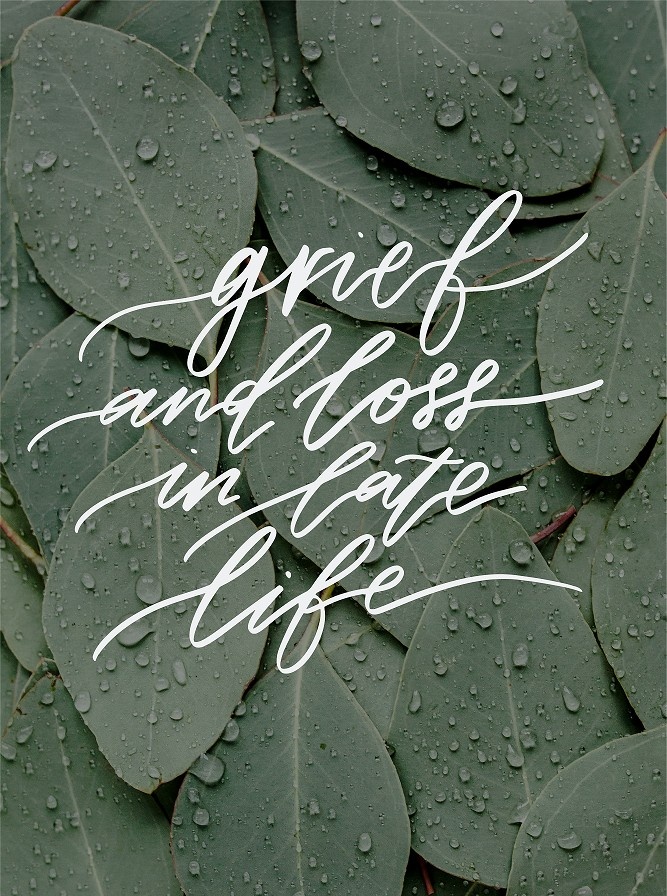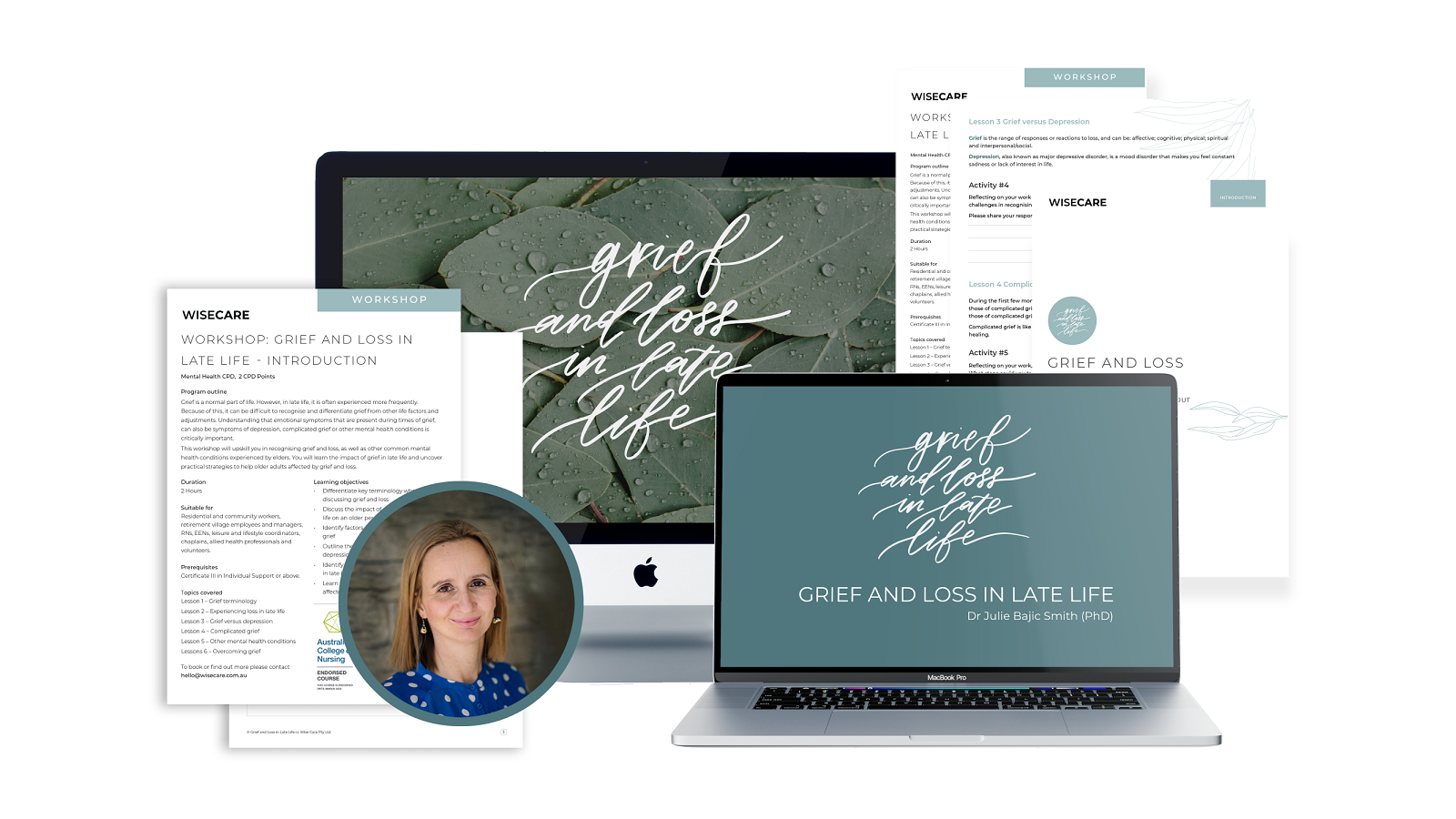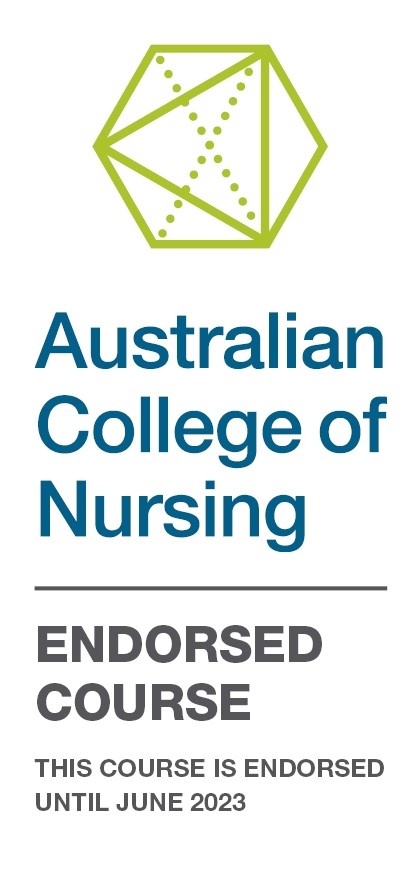Grief and Loss in Late Life - Introduction
Knowing how to support those impacted by grief is a skill which requires patience, time and space. There may be no words that can really help but listening can be a great support. Don’t be afraid to talk about the person who has died — the person you are supporting may want to hear their name. Try to avoid giving advice or using clichés.
On Friday 19 May 2023 12-2 pm AEST, join me for a two hour LIVE training on Grief and Loss in Late Life.
This is an industry endorsed program for which you will receive a certificate of completion. You will have access to the online portal for the life of the workshop and all relevant updates.
ACN and ACWA endorsed activity (2 CPD hours)
Sign up Below
Do you support the elderly and struggle to detect if they are experiencing grief and loss or if there are other factors?
This workshop will upskill you in recognising grief and loss, as well as other common mental health conditions experienced by elders.
You will learn the impact of grief in late life and uncover practical strategies to help older adults affected by grief and loss.
This workshop will show you how to:
- Differentiate key terminology when discussing grief and loss
- Discuss the impact of grief and loss in late life on an older person
- Identify factors associated with complicated grief
- Outline the difference between grief and depression
- Identify common mental health conditions in late life
- Learn helpful strategies for older adults affected by grief and loss


Recognising grief can be difficult.
Older people may experience a number of setbacks as their health deteriorates and the level of support needs increases. Many aged care professionals from a wide range of backgrounds (carers, RNs, allied health professionals, chaplains and others) often struggle to work out if the person is depressed, grieving or if something else is going on.
Imagine you could…
Learn the Key Terms
It is not uncommon to use a range of terms when discussing grief and loss. However, to fully understand what is going on we need to be confident with the terminology and definitions.
Differentiate Grief and Depression
The two can be similar but are not the same. Learn key concepts surrounding grief and how it is similar and dissimilar to depression.
Overcoming Grief
Easy strategies you can incorporate into your role when discussing grief with your clients. We also touch on Workplace Grief and Loss, important topic for those supporting the elderly and frail.
If you want a broad overview of grief and loss in late life , then you have come to the right place. This two hour workshop will help to build the foundations of this important topic.
Introducing

This workshop equips you with the foundations of Grief and Loss in Late Life.
You could be working as a carer, care supervisor or team leader, enrolled nurse, registered nurse, allied health professional, chaplain or a volunteer.
Delivered online with the endorsement from the Australian Community Workers Association (ACWA), this 2-hour workshop will help you understand the grief terminology, experiencing loss in late life, grief versus depression, complicated grief, other mental health conditions and overcoming grief.

Meet your Instructor
From early in my career, I knew I wanted to work with older adults to improve their wellbeing in late life. However, a decade ago when I searched for a role as an ‘aged care psychologist’ I was shocked to discover not a single job listing! That’s when I founded Wise Care and began practising on my own.
For five years, I travelled to aged care homes and facilities to provide treatment and face-to-face intervention for the elderly – and I kept hearing the same thing from my patients:
‘I’m not getting the right emotional support from my caregivers.’
I felt compelled to do something to change this. To empower aged care workers and residents with the tools and strategies needed to feel positive and connected, instead of isolated and unheard. So, I returned to university and completed my PhD in Emotional and Psychological Wellbeing in Home Care Workers and have evolved from there to become an aged care psychology consultant.
Over the past ten years, I’ve seen the prevalence of depression in aged care residents sharply rise. What was once an alarming statistic has now grown to become a mental health crisis. But sadly, issues like isolation, anxiety, depression and suicidal thoughts among older people remain a blind spot that is rarely acknowledged or discussed.
I work with some of the most recognised aged care organisations, and deliver training and support to thousands of aged care workers, allied health professionals, and families across Australia to help their loved ones make a smooth transition into aged care.
I believe that with the right strategies and skills, together, we can shape a better future for everyone in aged care.
Accreditation
Psychology Board of Australia – Full Registration
Board Approved Psychology Supervisor
Recognition
2013; 2014 Winner of the Positive Living in Aged Care Award
2019 Nominated for the Allied Health Impact Achievement Award for my work in supporting residents, teaching staff and families on how to boost wellbeing for the elderly.
Here is the breakdown
( a look at the course content)
Lesson 1
In this module we identify the key terms when discussing grief and we define each one. This is an important lesson and sets the foundation for the rest of the workshop.
Lesson 2
This lesson explores what it means to experience loss in late life. We take a holistic approach to wellbeing in late life and the number of factors which can contribute to losses.
Lesson 3
There is a big overlap between depression and grief and this module helps participants learn how to differentiate the two. It is true that a person who is depressed can experience grief and those who experience grief for too long may be at risk of developing depression.
Lesson 4
Complicated grief is not something every person who experiences grief will have and in this module we look at the difference between grief and complicated grief. Participants will learn key concepts when discussing complicated grief.
Lesson 5
There are a number of mental health conditions the older person may be experiencing. In this module we will cover the most common mental health conditions and how they can overlap with grief.
Lesson 6
In this module we discuss practical strategies we can implement with older adults impacted by grief. We also touch on Workplace Grief and Loss, very important and often not addressed topic.
Here’s Why You'll Enjoy This Training:

Reason 1
We use practical strategies you can use right away with your clients.

Reason 2
The language used is simple, relevant and practical and translated from complex research.

Reason 3
Access to resources, templates and handouts - this will help you translate the teachings from this workshop to your workplace.

Reason 4
You can return to the online portal any time. If you want to revisit a module, download the resources you can do it whenever you like.




Today, more than ever, the aged care workforce needs to be tuned in to the emotional state of their clients...
... and equipped with the knowledge and strategies necessary to deliver the appropriate level of emotional support.
Gone are the days where we can just say ‘speak with a counsellor or a GP’.
Workers need to know how to help clients in the delivery of day-to-day care where clients may be emotionally unwell. Workers also need access to a toolbox of practical self-care strategies to avoid burnout in what is without a doubt a demanding profession.

